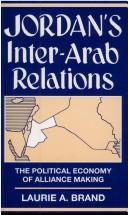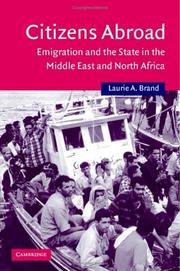| Listing 1 - 6 of 6 |
Sort by
|

ISBN: 0231067224 0231067232 9780231067225 Year: 1988 Publisher: New York, N.Y. Columbia University Press
Abstract | Keywords | Export | Availability | Bookmark
 Loading...
Loading...Choose an application
- Reference Manager
- EndNote
- RefWorks (Direct export to RefWorks)
Palestinian Arabs --- Politics and government. --- Societies, etc. --- History. --- anno 1960-1969 --- anno 1950-1959 --- Palestine --- Politics and government --- History --- Egypt --- Jordan --- Kuwait --- Palestinian Arabs - Politics and government. --- Palestinian Arabs - Societies, etc. - History. --- Palestinian Arabs - Egypt. --- Palestinian Arabs - Jordan. --- Palestinian Arabs - Kuwait.
Book
ISBN: 9780804792165 9780804789608 9780804792325 0804792321 0804789606 080479216X Year: 2014 Publisher: Stanford, Calif. Stanford University Press
Abstract | Keywords | Export | Availability | Bookmark
 Loading...
Loading...Choose an application
- Reference Manager
- EndNote
- RefWorks (Direct export to RefWorks)
Until the recent uprisings in the Middle East and North Africa, the resilience of authoritarian regimes seemed a fundamental feature of regional politics. While economic, political, and internal security policies are most often considered in discussions of regime maintenance, Laurie Brand introduces a new factor, that of national narratives. Portrayals of a country's founding, identity, and bases of unity can be a powerful strategy in sustaining a ruling elite. Brand argues that such official stories, which are used to reinforce the right to rule, justify policies, or combat opponents, deserve
Internal politics --- Sociology of culture --- Political sociology --- anno 1980-1989 --- anno 1960-1969 --- anno 2000-2009 --- anno 1950-1959 --- anno 1970-1979 --- anno 1990-1999 --- Egypt --- Algeria --- Algeria -- Politics and government -- 1962-1990. --- Algeria -- Politics and government -- 1990-. --- Egypt -- Politics and government -- 1952-1970. --- Egypt -- Politics and government -- 1970-1981. --- Egypt -- Politics and government -- 1981-.

ISBN: 0231100973 Year: 1995 Publisher: New York (N.Y.): Columbia university press
Abstract | Keywords | Export | Availability | Bookmark
 Loading...
Loading...Choose an application
- Reference Manager
- EndNote
- RefWorks (Direct export to RefWorks)
Arab countries --- Jordan --- Yarden --- Jordanien --- Giordania --- Hashemite Kingdom of Jordan --- Mamlakah al-Urdunīyah al-Hāshimīyah --- Urdun --- Hashimite Kingdom of the Jordan --- Jordania --- Mamlaka al-Urduniya al-Hashemiyah --- Urdunn --- Transjordan --- Arab world --- Arabic countries --- Arabic-speaking states --- Islamic countries --- Middle East --- Foreign relations

ISBN: 9780521858052 9780521100915 0521858054 9780511491498 0511147031 9780511147036 0511146450 9780511146459 0511146019 9780511146015 0511491492 1280431962 9781280431968 1107156068 9781107156067 0511184042 9780511184048 0511312539 9780511312533 0521100917 Year: 2006 Volume: 23 Publisher: Cambridge, UK New York
Abstract | Keywords | Export | Availability | Bookmark
 Loading...
Loading...Choose an application
- Reference Manager
- EndNote
- RefWorks (Direct export to RefWorks)
Despite the fact that the majority of emigration today originates in the global south, most research has focused on the receiving states of Europe and North America, while very little attention has been paid to the policies of the sending states toward emigration or toward their nationals abroad. Taking the country cases of Morocco, Tunisia, Lebanon and Jordan, this work explores the relationship between the government of the sending states, the outmovement of their citizens and the communities of expatriates that have developed. By focusing on the evolution of government institutions charged with various aspects of expatriate affairs, this work breaks new ground in understanding the changing nature of the relationship between expatriates and their home state. Far from suggesting that the state is waning in importance, the conclusions indicate that this relationship provides evidence both of state resilience and of new trends in the practice of sovereignty.
Migration. Refugees --- Internal politics --- Middle East --- North Africa --- Transnationalism --- Aliens --- Transnationalisme --- Etrangers --- Africa, North --- Moyen-Orient --- Afrique du Nord --- Emigration and immigration. --- Emigration and immigration --- Emigration et immigration --- Government policy --- Transnationalism. --- Citizenship --- Barbary States --- Maghreb --- Maghrib --- Asia, South West --- Asia, Southwest --- Asia, West --- Asia, Western --- East (Middle East) --- Eastern Mediterranean --- Fertile Crescent --- Levant --- Mediterranean Region, Eastern --- Mideast --- Near East --- Northern Tier (Middle East) --- South West Asia --- Southwest Asia --- West Asia --- Western Asia --- Orient --- Noncitizens. --- Noncitizens --- Social Sciences --- Political Science --- Émigration et immigration --- Citoyenneté --- Politique publique --- Études comparatives --- Proche-Orient --- Aliens. --- Émigration et immigration --- Citoyenneté --- Études comparatives
Book
ISBN: 9780231112673 Year: 1998 Publisher: New York, N.Y. Columbia University Press
Abstract | Keywords | Export | Availability | Bookmark
 Loading...
Loading...Choose an application
- Reference Manager
- EndNote
- RefWorks (Direct export to RefWorks)
Social change --- Sociology of the family. Sociology of sexuality --- Human rights --- anno 1980-1989 --- anno 1990-1999 --- Middle East --- Arab states --- Maghreb
Book

ISBN: 9781685855208 1685855202 Year: 2023 Publisher: Boulder
Abstract | Keywords | Export | Availability | Bookmark
 Loading...
Loading...Choose an application
- Reference Manager
- EndNote
- RefWorks (Direct export to RefWorks)
This original work assesses the impact of globalization on women in Middle Eastern societies. To explore the gendered effects of social change, the authors examine trends within, as well as among, states in the region. Detailed case studies reveal the mixed results of global pressures. For some women, for example, globalization has meant increased access to education and employment; for others, it has resulted in heightened repression under ideologically conservative regimes. The authors' nuanced analyses document how women's responses to these changes are affecting the future of the Middle East.
| Listing 1 - 6 of 6 |
Sort by
|

 Search
Search Feedback
Feedback About UniCat
About UniCat  Help
Help News
News